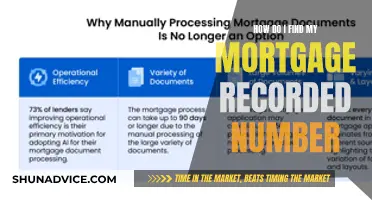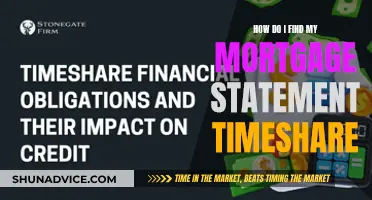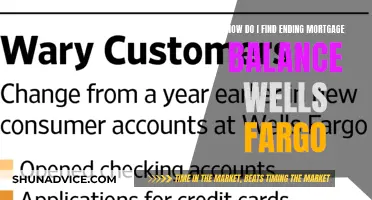
Robo-signing is the rapid signing of foreclosure affidavits without verifying the validity of the information contained in the documents. It is a federal crime to sign someone's name to a legal document, and it is also illegal to sign your name to an affidavit without verifying the information. Robo-signing can make it difficult to know who has the right to foreclose on your home if you fall behind on your payments. If you believe that your lender robo-signed your documents, it is important to take immediate action and consider talking to an attorney. To identify whether your mortgage was robo-signed, you can look for signatures of known robo-signers, such as Linda Green, and check for vastly different handwriting styles indicating that the signature may have been forged.
| Characteristics | Values |
|---|---|
| Definition | Robo-signing is when a person signs documents without knowing or understanding their contents. |
| Who is a robo-signer? | An employee of a mortgage servicing company who signs foreclosure documents without reviewing them. |
| Why do people robo-sign? | High workloads, high expectations for turnout, and lack of employee training. |
| Impact | Robo-signing makes it difficult to know who has the right to foreclose on a home. |
| Action | If you believe your lender robo-signed your documents, consider talking to an attorney. |
What You'll Learn
- Robo-signing is the rapid signing of foreclosure documents without verifying their contents
- Robo-signing makes it difficult to know who has the right to foreclose on a property
- Robo-signing is a federal crime and can be punished by prison time
- Robo-signing was a major factor in the 2008 Financial Crisis and the 2010 housing crisis
- If you suspect robo-signing, consult a foreclosure attorney

Robo-signing is the rapid signing of foreclosure documents without verifying their contents
Robo-signing is a term used to describe the rapid signing of foreclosure documents without verifying their contents. It is important to understand the process of foreclosure to comprehend the implications of robo-signing. During a foreclosure, the mortgage servicer or holder typically submits an affidavit stating the homeowner has defaulted on their mortgage payments, providing a valid cause for foreclosure. Affidavits are sworn statements that must be signed in front of a notary public, attesting to the truth of the information.
Robo-signing occurs when employees of mortgage servicing companies, known as robo-signers, sign these foreclosure documents without properly reviewing them. Instead of carefully examining each case, robo-signers assume the paperwork is correct and sign it automatically, like robots. This practice is often driven by high workloads and expectations to meet quotas, leading to a rapid-fire signing of documents.
The consequences of robo-signing are significant. Firstly, it undermines the validity of the foreclosure process. Since the robo-signers do not review the documents, they cannot confirm the accuracy of the information, including whether the homeowner is truly in default or if the lender has the legal right to foreclose. This lack of verification can result in faulty or illegitimate foreclosure documents, as seen in the 2010 robo-signing scandal involving major U.S. banks.
Additionally, robo-signing contributes to economic harm. The mortgage bargaining process involves a bundle of rights and procedures, and borrowers pay more for legal processes in judicial foreclosure states. Robo-signing cheats borrowers of these procedural rights, leading to rampant fraud and a loss of confidence in the markets. Furthermore, it can lead to unfair lending practices, where applicants who deserve approval are denied, and those who should be denied are approved.
To identify if your mortgage was robo-signed, you can examine your loan, foreclosure, or mortgage documents for any signs of robo-signing. If you suspect robo-signing, it is essential to take immediate action and consider consulting an attorney to discuss your legal options.
Finding Your Mortgage History: A Step-by-Step Guide
You may want to see also

Robo-signing makes it difficult to know who has the right to foreclose on a property
Robo-signing is when a person signs documents without knowing or understanding their contents. This is a serious problem when it occurs with mortgage transfer documents. It can make it difficult to know who has the right to foreclose on a property if the owner falls behind on their payments.
Robo-signing was a significant issue during the 2008-2010 housing crisis, when mortgages were being transferred between many different parties. This made it hard to know which party had the legal right to foreclose. Robo-signing is not illegal, but it is a federal crime to sign someone else's name on a legal document or to sign your name on an affidavit without verifying the information.
The common law statute of frauds requires all contracts related to land transfers to be in writing and most states interpret this to mean that mortgage documents must have genuine signatures to be valid. A robo-signer's signature is meaningless since they don't know what they are signing. As a result, in many states, if a transfer document has been robo-signed, the transfer is considered invalid, leaving doubt about which party has the right to foreclose.
Robo-signing also led to losses for banks and investors since the borrower might not have been qualified for the loan but got approved anyway due to robo-signing. This can also make it challenging to know whether the foreclosure is legal or not.
Finding Your Mortgage Account Number: A Simple Guide
You may want to see also

Robo-signing is a federal crime and can be punished by prison time
Robo-signing is a serious issue that can have significant implications for homeowners facing foreclosure. While there is no federal law specifically prohibiting robo-signing, it is a federal crime to sign someone else's name to a legal document, and it is also illegal to sign an affidavit without verifying the information it contains. These offences carry the possibility of prison time.
Robo-signing refers to the practice of signing documents without understanding their contents, which can render the documents invalid and create uncertainty about the legal right to foreclose on a property. This issue came to light during the housing crisis and Great Recession, when it was revealed that banks and other lenders were improperly foreclosing on properties through formulaic processing. The practice has been the subject of investigations and settlements, with some financial institutions fined and executives prosecuted.
In the context of mortgages, robo-signing can occur when employees of banks or lenders sign thousands of foreclosure-related documents per month without properly reviewing them. This can lead to invalid transfers of mortgage documents and affect the rights of homeowners and investors.
If you suspect that your mortgage may have been robo-signed, it is essential to consult with a foreclosure defence attorney. They can help you understand your rights and options, including the possibility of delaying or stopping the foreclosure process. Additionally, in states where it is required, you can request that the company foreclosing on your home prove that they have the authority to do so.
While there is no federal law specifically prohibiting robo-signing, it is important to note that the practice can violate other laws and regulations. The lack of specific legislation addressing robo-signing directly contributes to the ongoing challenges in resolving this issue comprehensively.
Discovering Your Original Mortgage Amount: A Simple Guide
You may want to see also

Robo-signing was a major factor in the 2008 Financial Crisis and the 2010 housing crisis
Robo-signing is when a person signs documents without knowing or understanding their contents. This is particularly problematic when it comes to mortgage transfer documents, as it can make it difficult to determine which party has the right to foreclose on a property.
Robo-signing was a significant factor in the 2008 Financial Crisis and the 2010 housing crisis. The financial crisis was caused by a combination of factors, including the inability of homeowners to make their mortgage payments, risky mortgage products, and high debt levels. As the crisis unfolded, attorneys examined the foreclosure process and discovered that robo-signing was widespread. This practice made it difficult to establish which entities had the legal right to initiate foreclosure proceedings, further complicating the crisis.
In the lead-up to the crisis, easy access to credit and lax lending standards allowed many buyers to purchase homes they could not afford, inflating housing prices and creating a housing bubble. When the economy slowed, many homeowners struggled to keep up with their mortgage payments, leading to a wave of foreclosures. The realization that banks were holding a significant number of worthless loans triggered a collapse in the financial system.
Robo-signing exacerbated the crisis by further obscuring the ownership of mortgage loans and the legal right to initiate foreclosures. This practice involved employees of banks and mortgage companies signing thousands of documents per month without properly reviewing them. As a result, the validity of many foreclosure proceedings was called into question, creating uncertainty and further destabilizing the financial system.
The widespread use of robo-signing during this period highlights the fragility of the financial system and the lack of proper oversight and regulation. The discovery of robo-signing also led to a loss of confidence in the markets and raised questions about the integrity of the foreclosure process. As a result, robo-signing played a significant role in the 2008 Financial Crisis and the subsequent housing crisis in 2010, contributing to the economic turmoil and the wave of foreclosures that impacted countless individuals and families.
Chase Mortgage Account: Locating Your Number Easily
You may want to see also

If you suspect robo-signing, consult a foreclosure attorney
Robo-signing is a serious issue that has impacted many mortgages and led to a significant number of foreclosures. If you suspect that your mortgage has been robo-signed, it is essential to consult a foreclosure attorney as soon as possible. Here are several reasons why:
Firstly, a foreclosure attorney can provide you with peace of mind and help you understand your legal options. They will review the facts of your case and determine whether you are a victim of fraud or robo-signing. This unbiased third-party perspective is crucial in protecting your rights as a homeowner.
Secondly, the attorney can assist in building a solid foreclosure defence. They are knowledgeable about the legal processes and requirements, including the necessary signatures and the validity of documents. This expertise can help identify any irregularities or invalid transfers in your mortgage documents.
Additionally, an attorney can help you navigate the complex securitization process, which involves multiple transfers of rights and responsibilities. Robo-signing can obscure the identity of the entities with the legal right to foreclose on your home. An attorney can aid in untangling this web of transfers and identify any discrepancies or invalid signatures.
Furthermore, consulting a foreclosure attorney can potentially help delay or halt the foreclosure process. This can buy you valuable time to explore alternative solutions or negotiate with the relevant parties.
It is worth noting that robo-signing is a widespread issue that has affected thousands of homeowners. By taking a proactive approach and seeking legal assistance, you can protect yourself from potential economic harm and ensure that your rights are upheld. Remember, even if robo-signing seems irrelevant, it does not make it legal, and you may have legal recourse to challenge it.
Who Owns Your Mortgage? Trace Your Mortgage Backers
You may want to see also
Frequently asked questions
Robo-signing is when a person signs documents without knowing or understanding their contents. This is particularly problematic when it's used with mortgage transfer documents.
Robo-signing can make it difficult to know who has the right to foreclose on your home if you fall behind on your payments. It can also lead to unfair and unethical lending practices.
If you believe that your lender robo-signed your documents, it is important to take immediate action and consider talking to an attorney about your case.
Robo-signing usually occurs when there is a high workload and high expectations for document turnover. If you notice that your documents have been signed with vastly different handwriting or that signatures are missing, this could indicate robo-signing.
Unfortunately, as a borrower, you may not have much control over whether your mortgage documents are robo-signed. However, you can be vigilant in reviewing your documents and seeking legal advice if you have any concerns.







